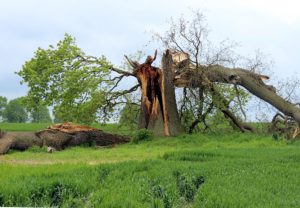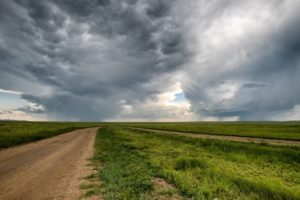While I love the warmer temperatures that come with spring and summer, I do not like the severe storms. As we have just seen here in Ohio, the results can be devastating to individuals. With severe storms, people may lose electricity and/or water which makes daily living tasks such as safely maintaining and preparing food, brushing teeth, showering, washing hands, and other things we take for granted difficult. Although we have already seen what mother nature can bring, there are things you can do to prepare for future storms and emergencies.
Are you someone who thinks, this won’t happen to my community? I admit, I often think this way. However, any location could have an emergency or a disaster. Being prepared will give you more options for keeping yourself and your family safe. One thing to do is to create a disaster plan. If you have children, include them in this process, as it can help them to feel more confident(PDF). Your plan should include an emergency supply list(PDF). I admit, my family does not have a plan, but I am going to work on one with my family so we can be more prepared.
Some types of disasters include flooding, tornadoes, lightning, mass shootings, extreme heat, fires, and snow or ice storms. To help ensure you and your family have safe food and water in the event of a weather emergency, follow these tips from the USDA:
- Keep an appliance thermometer in the refrigerator and freezer. An appliance thermometer indicates the temperature in the refrigerator and freezer. In the case of a power outage, it can help determine the safety of the food.
- Make sure the freezer is at 0 °F or below and the refrigerator is at 40 °F or below.
- Freeze containers of water ahead of time for ice to help keep food cold in the freezer, refrigerator, or coolers after the power is out. Freeze gel packs for use in coolers.
- Freeze refrigerated items such as leftovers, milk, and fresh meat and poultry that you may not need immediately — this helps keep them at a safe temperature longer.
- Plan ahead and know where dry ice and block ice can be purchased.
- Have coolers on hand to keep refrigerated food cold if the power will be out for more than 4 hours.
- Group food together in the freezer – this helps the food stay cold longer.
- Store food on shelves that will be safely out of the way of contaminated water in case of flooding.
No matter how prepared you might be for an emergency, you or your family members may experience some difficulties in the aftermath. Many people have financial strains that add to the concerns of meeting basic needs. Don’t hesitate to seek help if your or your family has any kind of emotional challenge after a disaster or an emergency. Many agencies offer counseling and other services to help people get through. My grandparents were killed during a storm when they pulled over and a tree fell on their vehicle. Some 40 years later, I still remember that day like it was yesterday. While I am able to function, I do NOT like storms, especially when I am in a vehicle.
Here’s to a safe summer and beyond!


